|
|
|
Sort Order |
|
|
|
Items / Page
|
|
|
|
|
|
|
| Srl | Item |
| 1 |
ID:
179569
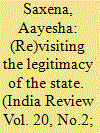

|
|
|
|
|
| Summary/Abstract |
The spread of the novel coronavirus that took over the world by a storm has caused a serious rupture in the social and economic order. As the Indian state is confronted by several challenges, the exodus of migrant labor appears as a gruesome spectacle. The already precarious lives of migrant labor owing to their employment in the informal economy has been amplified manifold with the outbreak of the pandemic. The eclipsed response of the state to acknowledge their misery has further exacerbated the problem. Since the state is entrusted with the responsibility of providing social security to the labor in the informal economy- a component that is also deemed necessary to be fulfilled by those the state seeks to govern, the pandemic has rendered the question of state’s legitimacy to be probed further. Defined as the capacity and the right to rule, the legitimacy of the state is analyzed from the perspective of the effective provision of social security schemes as well as the expedition/suspension of labor rights. While the state may possess the capacity to provide for social security, and it certainly does as is evident from its boisterous declarations of fiscal stimulus’ for labor welfare, it is argued that the state’s blatant lack of willingness to translate its promises into concrete action puts the “right to rule” aspect under scrutiny and its legitimacy under jeopardy.
|
|
|
|
|
|
|
|
|
|
|
|
|
|
|
|
| 2 |
ID:
143667
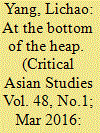

|
|
|
|
|
| Summary/Abstract |
This article explores the health, disease and socioeconomic circumstances of garbage collectors in Guiyang, southwestern China. It aims to contribute to medical anthropology and understandings of Chinese society by examining garbage collectors’ understandings of waste picking, pollution and the health risks and diseases associated with their struggles for survival at the “bottom of the heap” of peri-urban society in contemporary China. Drawing on one month of ethnographic fieldwork, it provides new insights into the oft-neglected subjectivity of individuals struggling for survival at the margins of Chinese society, and how this subjectivity is shaped by their structural position as well as by their own agency in making sense and making the best of their lives.
|
|
|
|
|
|
|
|
|
|
|
|
|
|
|
|
| 3 |
ID:
085261
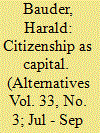

|
|
|
|
|
| Publication |
2008.
|
| Summary/Abstract |
As subordinate workers, migrants and foreigners are an essential labor force for industrialized economics.
|
|
|
|
|
|
|
|
|
|
|
|
|
|
|
|
| 4 |
ID:
082801
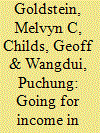

|
|
|
|
|
| Publication |
2008.
|
| Summary/Abstract |
Rural Tibet is in the throes of a major paradigm shift from a predominately subsistence agricultural economy to a new mixed economy in which non-farm income plays a dominant role. This paper examines this change, comparing longitudinal data collected through direct fieldwork in rural Tibet in 1997-98 and 2006-07
|
|
|
|
|
|
|
|
|
|
|
|
|
|
|
|
| 5 |
ID:
143550
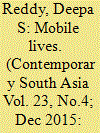

|
|
|
|
|
| Summary/Abstract |
Much has been said and written about the role of the mobile phone in modulating social behaviours and cultural dynamics in India. Far less attention has been paid, however, to emerging cultural narratives about the phone which showcase the active, often troublesome and intrusive role the device plays in increasingly technologically inflected lives and landscapes. How are we to understand these new readings of the phone as itself a protagonist in our cultural lives? This essay uses a series of cultural reference points (movies, plays, news-media reports, popular music) to survey new metaphoric and symbolic terrains that the mobile phone guides us through. The mobile device's character, I argue, is totemic: it acquires the capacity to express desires, aspirations, and ambivalences; invoke social differences, and assert cultural norms. What Indian cultural narratives reveal is the desire for communion with the technologies which now both contain our natures and hold them up to view. The mobile phone plays a critical role in this process of reflection and self-making.
|
|
|
|
|
|
|
|
|
|
|
|
|
|
|
|
| 6 |
ID:
174879
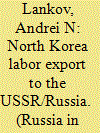

|
|
|
|
|
| Summary/Abstract |
The export of North Korean labor to Russia began in 1946 and continued, almost uninterrupted, until recently. The arrangements behind this labor migration project underwent dramatic revision from time to time, so we have to speak about three different periods: recruitment of North Koreans for work in fisheries in the 1940s and 1950s, dispatch of heavily controlled logging teams in the 1960s-1990s, and work of North Korean building crews, mainly on an autonomous basis, since the late 1990s. These periods reflect the way relations between the two states have been developing, and the change of their political concerns and interests. However, the underlying rationale has not changed much over the decades: the Soviet/Russian state needed cheap and docile labor, while the DPRK needed an additional source of hard currency and North Koreans were enthusiastic about getting lucrative job opportunities. On balance, both sides have been able to get what they hoped to get, and this has ensured the project’s long life.
|
|
|
|
|
|
|
|
|
|
|
|
|
|
|
|
| 7 |
ID:
132035
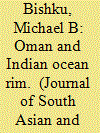

|
|
|
| 8 |
ID:
139494
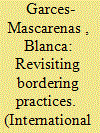

|
|
|
|
|
| Summary/Abstract |
Through a detailed case study of immigration policies in Malaysia, this article examines processes of bordering in a country where physical borders do not seem to play a pivotal role. It describes how, in Malaysia, immigration policies neither focus on border control nor pose strict limits on immigrants’ entry but rather seek to curtail immigrants’ presence once in the country. The analysis of this “securitization from within” allows us to make three interconnected arguments. First, no border control does not mean no immigration control. Second, confines or internal borders play a decisive role in the construction and preservation of a cheap, flexible labor force. However, despite the disproportionate power of the Malaysian executive, these confines are systematically challenged by immigrants’ everyday practices either by resorting to illegality or by reentering the country after deportation. Thus, when the contours of legality are very narrow, illegality does not necessarily mean a more subordinated form of existence but rather a way to resist state control. Third, both foreigners and citizens can be deprived of their most basic rights. In this regard, the conventional wisdom that citizenship draws a clearly defined line of exclusion/inclusion proves to be wrong in the case of Malaysia.
|
|
|
|
|
|
|
|
|
|
|
|
|
|
|
|
|
|
|
|
|